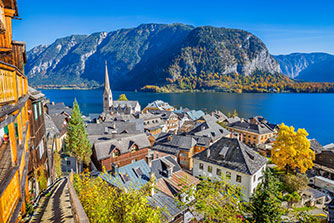
Austria - History

The earliest Austrian civilisation the "Hallstatt" whose prosperity was based on salt mining at Dürrnberg near Hallein in the province of Salzburg.
The Romans knew of the commercial importance of this area, and first by peaceful penetration and later by force gradually ousted the Celts after their incursions of 279 B.C. The Romans enhanced their rule along the Danube by establishing the Province of Pannonia, which stretched from the eastern frontier of Noricum to roughly the site of present-day Budapest.
Planning a holiday with your family? Get a travel insurance quote from Travel Insurance Saver
Slavic tribes crossed the Alps during the 7th century, establishing a realm which covered much of eastern and central Austrian territory. While simultaneously Germanic tribe in the 5th and 6th century settled in the west of the country and in Bavaria, while what is today Vorarlberg had been settled by the Alemans.
Planning a ski holiday & need travel insurance for Skiing and Snowboarding?
From the 700’s Bavarian settlers moved to the Danube and the Alps, a process creating effectively Austria the country it is today.
Compare our travel insurance prices online from Travel Insurance Saver.
In 976 after the revolt of Henry II, Duke of Bavaria the Babenberg Dukes came to be one of the most influential ruling families in the region, reaching a pinnacle in the reign of Leopold VI (1198–1230).
Pregnant and need travel insurance for an overseas holiday. Compare quotes from Travel Insurance Saver.
Following the extinction of the Babenbergs in the 13th century, Austria came under the rule of the Czech King Otakar II. Contesting the election of Rudolf I of Habsburg as Emperor, Otakar was defeated and killed by the German King, who took Austria and gave it to his sons in 1278. Austria was ruled by the Habsburgs for the next 640 years.
Quick and Easy Travel Insurance, Get a travel insurance quote today.
Austria and the other Habsburg hereditary provinces (and Hungary and Bohemia, as well) were much affected by the Reformation. Although the Habsburg rulers themselves remained Catholic, the provinces themselves largely converted to Lutheranism, which Ferdinand I and his successors, Maximilian II, Rudolf II, and Mathias largely tolerated.
The long reign of Leopold I (1657–1705) saw the culmination of the Austrian conflict with the Turks. Following the successful defence of Vienna in 1683 led by the King of Poland John III Sobieski, a series of campaigns resulted in the return of all of Hungary to Austrian control by the Treaty of Carlowitz in 1699.
Australian senior and need cover for overseas? International travel insurance for seniors available online.
In 1745, following the reign of the Bavarian Elector as Emperor Charles VII, Maria Theresa's husband Francis of Lorraine, Grand Duke of Tuscany, was elected Emperor, restoring control of that position to the Habsburgs (or, rather, to the new composite house of Habsburg-Lorraine).
On Maria Theresa's death in 1780, she was succeeded by her son Joseph II.
Upon Joseph's death he was succeeded by his brother, Leopold II, who secured a peace with Turkey in 1791, and negotiated an alliance with Prussia Leopold's reign which also saw the acceleration of the French Revolution. Leopold whilst sympathetic to the revolutionaries, he was the brother of the French queen. Although Leopold did his best to avoid war with the French, he died in March of 1792. The French declared war upon his death a month later.
Get a travel insurance quote online to Compare our travel insurance plans.
The war with France, which lasted until 1797, proved unsuccessful for Austria. After some brief successes against the utterly disorganised French armies in early 1792, the tide turned, and the French overran the Austrian Netherlands in the last months of 1792.
travel insurance for one way trip? Travel Insurance Saver offer travel insurance for one-way trips. Obtain a quote online now.
By the Treaty of Pressburg, Austria was forced to give up large amounts of territory—Dalmatia to France, Venetia to Napoleon's Kingdom of Italy, the Tyrol to Bavaria, and Austria's various Swabian territories to Baden and Württemberg, although Salzburg, formerly held by Francis's younger brother, the previous Grand Duke of Tuscany, was annexed by Austria as compensation.
travel insurance for backpackers? Australian backpackers going overseas can compare online travel insurance quotes from Travel Insurance Saver.
In 1859, the defeats at Solférino and Magenta against the combined forces of France and Sardinia led to the loss of Lombardy and Tuscany to the Kingdom of Sardinia, which was striving to create a unified national Italian state.
The defeat at Königgrätz in the Austro-Prussian War of 1866 resulted in Austria's exclusion from Germany and the German Confederation was dissolved..
In 1878, Austria-Hungary occupied Bosnia and Herzegovina, which had been cut off from the rest of the Ottoman Empire by the creation of new states in the Balkans. The territory was annexed in 1908 and put under joint rule by the governments of both Austria and Hungary.
The assassination of Archduke Franz Ferdinand, who was the presumed heir of Franz Joseph as Emperor, in Sarajevo triggered World War I. The defeat of the Central Powers in 1918 resulted in the disintegration of Austria-Hungary. Emperor Karl of Austria, who had ruled since 1916, went into exile.
Following the defeat of Austria-Hungary in World War I, the Empire was broken up based loosely on national grounds. Austria, with its modern borders, was created out of the main German speaking areas.
On February 12, 1934, the new Austrofascist regime provoked the Austrian Civil War by ordering search warrants for the headquarters of the socialist party. At that time the socialist party structures were already weakened, and the uprising of its supporters was quickly defeated. Subsequently the socialist party and all its ancillary organisations were banned.
Travel insurance for a cruise. Automatically included cruise cover on all overseas travel insurance policies from Travel Insurance Saver.
The Patriotic Front government frustrated the ambitions of pro-Hitlerite sympathizers in Austria who wished both political influence and unification with Germany, led to the assassination of Dollfuss on July 25, 1934. His successor Schuschnigg maintained the ban on pro-Hitlerite activities in Austria, but was forced to resign on March 11, 1938, following a demand by Hitler for power-sharing with pro-German circles. Following Schuschnigg's resignation, German troops occupied Austria with no resistance.
Whilst the Treaty of Versailles and the Treaty of St. Germain had explicitly forbidden the unification of Austria and Germany on March 12, 1938, German troops entered Austria, who met celebrating crowds, in order to install Nazi puppet Arthur Seyss-Inquart as Chancellor.
As a result, Austria ceased to exist as an independent country. This annexation was enforced by military invasion, but large parts of the Austrian population were in favour of the Nazi regime, many Austrians would participate in its crimes.
Just before the end of the war, on March 28, 1945, American troops set foot on Austrian soil and the Soviet Union's Red Army crossed the eastern border two days later, taking Vienna on April 13. American and British forces occupied the western and southern regions, preventing Soviet forces from completely overrunning and controlling the country.
In April 1945 Karl Renner, an Austrian elder statesman, declared Austria separate from Germany and set up a government which included socialists, conservatives, and communists. This contributed to the Allies treating Austria more as a liberated, rather than defeated country.
Though under occupation, this Austrian government was officially permitted to conduct foreign relations with the approval of the Four Occupying Powers under the agreement of June 28, 1946. As part of this trend, Austria was one of the founding members of the Danube Commission formed on August 18, 1948. Austria would benefit from the Marshall Plan.
Travel insurance for a long trip. Compare our travel insurance quotes today.
The termination of allied occupation, Austria was proclaimed a neutral country, and "everlasting" neutrality was incorporated into the Constitution on October 26, 1955.
In Spring 1986, Kurt Waldheim was elected president amid considerable national and international protest because of his possible involvement with the Nazis and war crimes during World War II. Fred Sinowatz resigned, and Franz Vranitzky became chancellor.
Austria joined the European Union in 1995 and Austria was set on the track towards joining the Eurozone, when it was established in 1999.
In 1993, the Liberal Forum was founded by dissidents from the FPÖ. It managed to remain in parliament until 1999. Viktor Klima succeeded Vranitzky as chancellor in 1997.
On 1 October 2006 the SPÖ won a head-on-head elections and negotiated a grand coalition with the ÖVP. This coalition started its term on 11 January 2007 with Alfred Gusenbauer as Chancellor of Austria. For the first time, the Green Party of Austria became the 3rd largest party in a nation-wide election, overtaking the FPÖ by a narrow margin of only a few hundred votes.
The grand coalition headed by Alfred Gusenbauer collapsed in the early summer of 2008 over disagreements about the country's EU policy.
Back to Austria Travel Insurance page.
Before choosing a policy, please be aware that terms and conditions, exclusions, limits and/or sub-limits will apply to most sections. It is important to read the Product Disclosure Statement (PDS) before making any purchase to ensure the cover provided matches your specific requirements.






